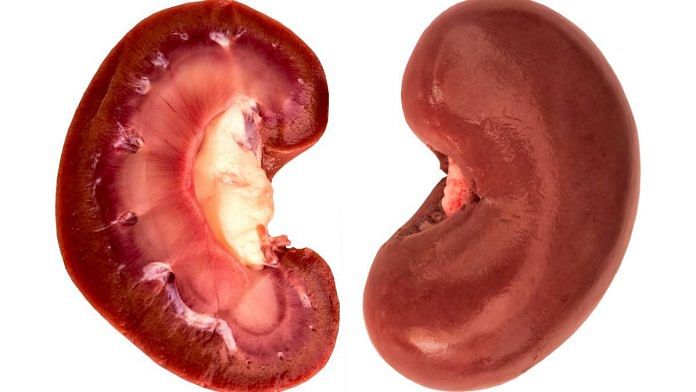Bengaluru: In a scientific first, a genetically engineered pig’s kidneys were transplanted into a 57-year-old brain-dead man by surgeons at the University of Alabama at Birmingham, US.
The kidneys began to produce urine within 23 minutes and remained viable till the end of the experiment, functioning for 74 hours. The procedure was described in a scientific paper published in the American Journal of Transplantation on 20 January — the first time a pig-to-human transplant procedure has been published in a peer-reviewed journal.
The experiment addressed critical safety and feasibility questions in xenotransplantation, or transplanting the organs of one species into another, and the results pave the way for future and immediate clinical trials.
The pig had been genetically edited so that its organs were more compatible with human bodies and less likely to be rejected. The researchers also didn’t find any infection in the man caused by viruses from the pig.
The kidneys produced urine but were unable to clear creatinine from the blood, which a normally functioning kidney does. The researchers suspect this was likely because of the brain injury that the patient, James Parsons, had suffered.
Parsons had been declared dead five days earlier, and the experiment was terminated when other organs started to fail and he started to severely haemorrhage 77 hours into it. The kidneys were not rejected at any point.
Also read: Argentinian woman naturally cured of HIV, is second such patient
The experiment
The team of surgeons calls their pre-clinical model experiment, conducted in late September 2021, the ‘Parsons Model’.
The pig had 10 modifications in its genome. Two human genes were inserted to prevent rejection, two for anticoagulation (prevention of blood clots), and two for immunomodulatory (regulatory adjustment of the immune system) purposes.
Three pig carbohydrate antigen genes were deleted, as was the pig growth hormone receptor gene. Pigs modified in this manner are also compatible with all human blood types as they don’t have red blood cell antigens.
Parsons had been declared deceased and was brain dead for five days before the experiment was performed. He had had mild-to-moderate kidney injury and had suffered trauma to the head. His family gave their consent for the procedure after having exhausted other transplant options.
While the transplanted kidneys performed their overall function, one produced more urine than the other. The creatinine levels in the body also did not decrease, as they normally do with functioning kidneys.
The researchers do not yet know the cause for either of these developments. They speculate that the urine production could have been affected by surgical procedure, and the failure to clear creatinine could have resulted from the deterioration of brain cells.
The researchers state that they decided to transplant both kidneys into one patient because the amount of pig nephrons (a basic unit of the kidney that produces urine) required to support a human system was unknown.
Future of organ transplants
In their paper, the researchers state that many barriers to xenotransplantation trials in humans have been overcome by their trial, which also identified areas where additional understanding is needed.
“Our study suggests that major barriers to human xenotransplantation have been surmounted and identifies where new knowledge is needed to optimise xenotransplantation outcomes in humans,” they write.
Xenotransplantation research has been advancing rapidly, and it is seen as a solution to the global organ shortage crisis. Of late, thanks to CRISPR and other genetic editing technologies, pig organs have been made increasingly compatible with those of humans.
Pigs are commonly used for xenotransplantation procedures as they are easier to raise and their organs reach adult human size by the age of six months.
Earlier this year, a genetically modified pig’s heart was successfully transplanted into a human for the first time at the University of Maryland. Last year, a pig’s kidney was temporarily externally attached to a patient in New York, functioning for 54 hours. It has become increasingly common for pig valves to be added to the hearts of human patients, and porcine pancreatic tissues have also been grafted onto humans.
(Edited by Rohan Manoj)
Also read: Discovery of insulin was about monstrous egos and career rivalries. And of course, diabetes



